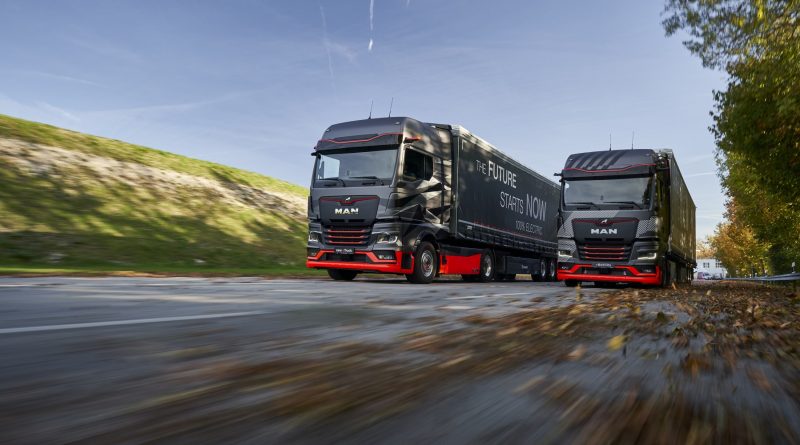DB Schenker starts MAN eTrucks from 2024
The new electric heavy-duty truck from MAN is already seeing high demand before its launch and the international logistics company DB Schenker and the commercial vehicle manufacturer MAN Truck & Bus have now signed an agreement to integrate for the first time the new MAN eTruck. DB Schenker is thus driving forward the electrification of its fleet and road freight transport with the company planning to add 100 new MAN eTrucks to its fleet by 2026. The first vehicles are to be handed over in the first half of 2024.
In the first half of 2024, the first MAN eTrucks will be produced in a small series on the production line at the company’s headquarters in Munich. With the signing of the agreement, DB Schenker is the first pilot customer for these eTrucks and includes setting up its own charging infrastructure, intelligent route planning and other digital services from MAN Digital Solutions such as eManager, ServiceCare and MAN Driver App. DB Schenker is therefore supported by 360° consulting from MAN Transport Solutions, including route analysis, charging strategy, charging infrastructure planning and energy demand optimisation.
The first MAN eTrucks for DB Schenker will be volume semitrailer tractors, so-called ultra semitrailer tractors. The low semitrailer height of around 950 mm makes it possible to transport electrically volume trailers with an internal height of 3 metres. Ten MAN eTrucks that DB Schenker will receive in 2024 will be ultra-tractor units. The other electric trucks to be delivered in 2025 and 2026 are planned as ultra-tractor units and swap body trucks.
“DB Schenker and MAN are pacing the path to an electric future together. We are very pleased to have our first customer for the new eTruck. The demand in the market for this fully electric vehicle is already enormous. The topic is now really picking up speed, also because more and more of our customers are setting themselves extremely ambitious decarbonisation targets. This has a direct impact on the logistics chains. However, we will only be able to achieve a sustainable mobility turnaround in heavy goods transport with the appropriate political support. This concerns, among other things, the rapid development of the charging infrastructure and also the further design of the funding framework for the acquisition of electric trucks,” said Alexander Vlaskamp, CEO of MAN Truck & Bus, at the New Year’s reception at MAN’s Munich site, which was also attended by the Bavarian Minister of Economic Affairs, Hubert Aiwanger.
The production of the future eTrucks has been prepared at MAN since 2021 in the MAN eMobility Center, as conventional diesel trucks and electric trucks will run off one assembly line during the ramp-up of electromobility. To this end, the workflows and process steps of planners, designers and start-up experts are mapped with pinpoint accuracy and any necessary adjustments are taken up immediately by the vehicle developers.
Elementary components of the eTrucks will be produced in Nuremberg in the future. MAN manufactures the high-voltage batteries at this site – currently still in small series production, but from the beginning of 2025 the battery packs will be produced in large series. To this end, the company is investing around 100 million euros over the next five years at the tradition-steeped production site for internal combustion engines. The commercial vehicle manufacturer is also receiving support from the Bavarian state government, which has pledged a contribution of around 30 million euros to energy research and technology funding for the period 2023 to 2027.
Click here to read about MAN’s eTGM award
Cyrille Bonjean, Head of Land Transport at DB Schenker Europe, said: “We want to build up practical experience with e-trucks as early as possible. In this way, we can quickly create an offer for the economy to make supply chains more climate-friendly. That’s why it was important for us to get the first MAN eTrucks. This brings us another step closer to our goal of being net zero on the road in land transport by 2040.”

